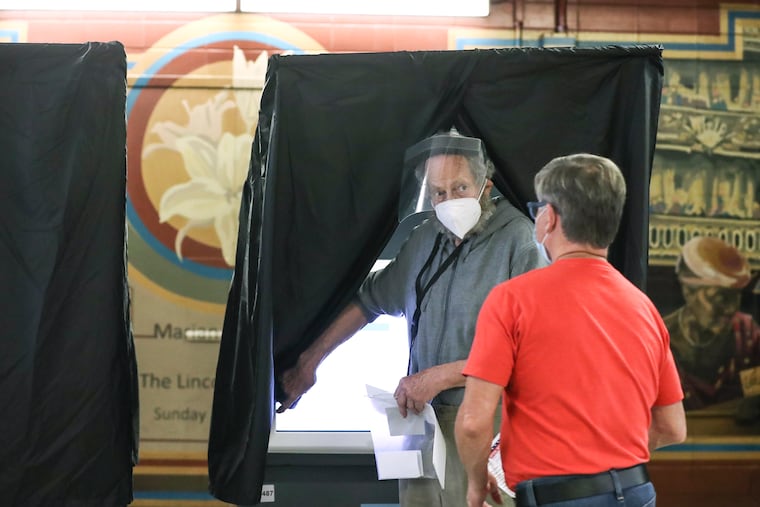It’s time to de-emphasize the ‘registration’ in voter registration efforts | Opinion
Adding more names to voter rolls is the goal of most registration efforts. Perhaps it’s time to focus on a new group: those who are already registered but don’t cast ballots.

Hot take: We need to soften the focus on voter registration in Philadelphia. I know this sounds counterintuitive. Especially as we approach Tuesday, National Voter Registration Day, which has registered 4.5 million people across America to date. Voter registration efforts work. And Philadelphians agree, with more than 90% of eligible Philadelphians registered since early 2021. But registering to vote is only the first step.
We need to focus our attention on a different audience: the 896,283 registered voters who did not vote in the city’s May primary election. An 80% gap between voters and registered nonvoters is a big one and needs a different approach.
There are many reasons why people do not vote. “Logistics” are often cited, including lack of transportation, child care, or time off of work (the same reasons people don’t show up for jury duty, too). Luckily, the newly instated vote-by-mail laws can eliminate some of these barriers. And over the years, employers have stepped up with civic engagement initiatives that promote voting incentives, including paid time off on Election Day. But the majority of the reasoning behind “nonvoting registered voters” tends to be lumped together under the term “voter apathy,” the act of just simply not caring, especially for an “off-year” election like the May primary.
» READ MORE: Bring voter registration to Philly high schools now | Opinion
However, these less publicized, nonpresidential elections are arguably more important because they affect local government. This past spring, we held primary elections for judges, district attorneys, and city controller candidates. There were also several essential ballot questions for which even nonparty affiliated voters could cast ballots.
The term “voter apathy” is systemically oppressive. It blames the individual for not voting instead of prioritizing institutions to inform and provide adequate access to the electoral process. Blaming the people for lack of engagement excuses the government and political system from fault.
In a 2020 Knight Foundation report that studied the “nonvoting voter,” major themes surfaced under the more general “voter apathy” label: Many nonvoters suffer from a lack of faith in the election system and have serious doubts about the impact of their votes, and nonvoters engaged less with news and are left feeling underinformed.
I’ve always been interested in this demographic, and have done my own nonscientific assessment over the years, especially when I was on the campaign trail in 2019 for city commissioner. Frankly, my observation is that many people don’t vote because people do not want to feel stupid. And sometimes voting in Philly makes you feel stupid.
» READ MORE: The voter suppression crisis no one is talking about | Opinion
The charter questions are complex, voting for judges is complicated, even understanding the difference between a state senator and a state representative is hard. And some could argue this information is difficult by design. People don’t vote because they don’t want to feel stupid, and we can’t blame them for that.
People need better access to clear information about what’s on the ballot and how it affects our day-to-day lives, including education on how the government works, how to serve their community, and why voting matters. We also need civics in school, but that ship has sailed for many adults who still need that education. And people need the information brought to them — not waiting on a shelf to be sought out (often through hours of confusing research).
Better Civics, the nonpartisan nonprofit I cofounded last year, is working to solve this. We partner with trusted messengers, like block captains, civic associations, and social service agencies, that are already engaging their constituents. We provide them with the tools they need to deliver easy-to-understand civic information. To explain the difference between a state senator and a state representative and how those roles, among others, affect people on a block-by-block basis unlocks a basic understanding that has been held captive for too long. We need to scale that 15-minute conversation with our neighbors to reach hundreds of thousands more on a year-round basis. We need adult civic education, and we need it now.
Voter registration will always be necessary, and incredible organizations are regularly doing this, like PA Youth Vote, registering every eligible high school student across the state. But maybe here in Philadelphia, we take this National Voter Registration Day as a moment to pause and celebrate the success of the number of registered Philadelphians — before we get back to work getting those 896,283 registered voters to the polls on Election Day.
Jen Devor is a resident of Point Breeze and president and cofounder of Better Civics, a nonpartisan nonprofit dedicated to revolutionizing civic engagement and voter turnout.